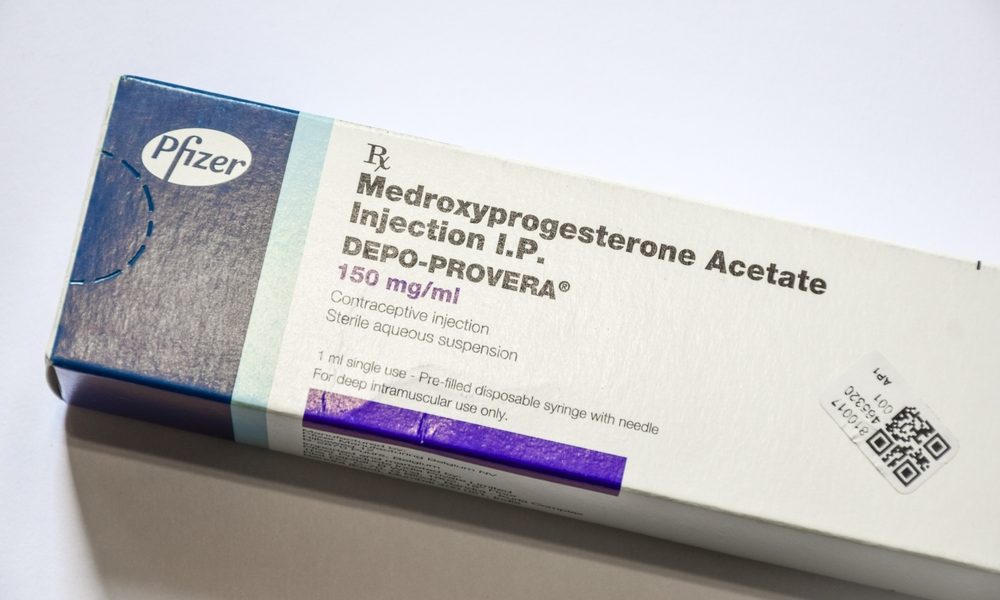For women who choose to utilize birth control methods, there are a variety of options available. They range from injectable shots, IUD devices, implants, the pill, and more. Some options are associated with hormones while others are hormone-free. For some, choosing birth control means selecting a method that suits their schedule and needs. The pill requires adhering to a set schedule. IUD devices need to be removed and replaced periodically. Injectable birth control needs to be given on a regular schedule every three months. Implants may need to be replaced.
How Does Depo-Provera Prevent Pregnancy?
Depo-Provera (depot medroxyprogesterone acetate) is an injectable form of birth control. This medication is injected into a fleshy surface like an arm or buttock. The birth control shot contains a type of progesterone that protects against pregnancy. While Depo-Provera protects against preventing pregnancy, the birth control shot does not protect against sexually transmitted infections (STIs). Condoms or barrier protection are still required to prevent the transmission of STIs.
The birth control shot works by impacting ovulation. Ovulation is the portion of the reproductive cycle when an egg is released from an ovary. Depo-Provera thickens the cervical mucus, which prevents sperm from reaching the egg, preventing pregnancy. It also suppresses ovulation, reducing the potential for an egg to be fertilized. The Depo-Provera injection functions by reducing the thickness of the uterine lining, which reduces the potential for a fertilized egg to implant and develop. Depo-Provera also works by changing the cervical environment, which reduces the possibility of pregnancy by reducing sperm functionality and viability.
Depo-Provera Side Effects and Other Uses
While an effective birth control method, Depo-Provera can have serious side effects. Using Depo-Provera may cause a woman to lose calcium stored in her bones and decrease bone density. The longer a person uses Depo-Provera, the greater the loss of calcium from bones. After Depo-Provera is discontinued, a person may not recover completely from the calcium loss. Calcium loss can contribute to porous bones which will increase the potential for broken bones. Medical professionals and Pfizer recommend that the birth control shot should not be used consecutively for more than two years as osteoporosis is possible due to the loss of calcium.
In addition to calcium loss, other side effects are possible including:
- Headaches
- Acne
- Changes in appetite
- Weight gain
- Nervousness
- Depression
- Changes in Menstrual periods – irregular periods, heavier or lighter periods or stop altogether
- Mood changes
- Hair growth
- Hair loss
- Decreased libido
- Breast tenderness
- Delayed return to fertility
After using Depo-Provera for a year, approximately 50 percent of women stop menstruating.
For some women, their healthcare provider may recommend using Depo-Provera to treat health conditions. For those with menstrual disorders, such as heavy menstrual bleeding, amenorrhea (absence of periods), and dysmenorrhea (painful periods), a medical provider may prescribe Depo-Provera to treat these conditions.
The birth control shot can also treat chronic pelvic pain, hirsutism (excess hair growth due to polycystic ovary syndrome or other hormone imbalances), and management of certain types of cancer. Depo-Provera can be used as part of reducing ovarian cysts for women who experience recurring ovarian cysts.
Some post-menopausal women are prescribed Depo-Provera for hormone replacement theory treatment, and as Depo-Provera reduces the thickness of the endometrial lining, it has been used by women who are at a high risk of developing endometrial cancer.
Who Should Not Use Depo-Provera?
Most women can use Depo-Provera, but some with certain health conditions should not use it. For women with heart disease or stroke risks, Lupus, breast cancer, liver disease, and unexplained vaginal bleeding using the birth control shot is not recommended and should be avoided. When considering Depo-Provera, consult with a medical provider to discuss your full medical history to determine if this method of birth control would be safe. Your healthcare provider must have a full picture of your health to ensure that they can offer important and personalized advice. They can help you understand the benefits and risks of this birth control option so you can make an informed decision before starting a new medication.
Depo-Provera Study Conducted About Brain Tumor Risks
Researchers published a study in the British Medical Journal (BMJ) in March 2024, which assessed potential medical risks associated with progestogen-associated birth control methods, including the Depo-Provera shot. This study is the largest one to assess potential risks associated with prolonged use of Depo-Provera for a year or more. While the BMJ study was the first of its kind, other smaller studies have suggested that hormones may contribute to the development of brain tumors.
The BMJ study has raised concerns about using synthetic hormones like progesterone, which Depo-Provera contains. Women using Depo-Provera for an extended time could have a higher risk of developing brain tumors, specifically intracranial meningiomas. This variety of meningioma forms around the protective layers of tissue that surround the spinal cord and brain. Most meningiomas are benign in nature but can cause serious health complications. Depending on the location of the meningioma, it can cause:
- Changes in vision
- Headaches
- Hearing loss
- Memory loss
- Seizures
- Trouble speaking
- Confusion
- Balance loss
- Loss of smell.
In some cases, surgery has been required to remove the meningioma. While meningiomas are rare, this diagnosis accounts for approximately one-third of all spinal cord and brain tumors.
Women who have been using progesterone-based birth control for five years or more are found to be at a much greater risk of developing meningioma when compared to women who have not used this type of medication. One of the lead authors on the BMJ study Dr. Véronique Duthiers shared, “Our research suggests that while short-term use of progestogen-only medications like Depo-Provera may be relatively safe, prolonged use could increase the risk of serious brain tumors like meningiomas.” The longer the patient uses Depo-Provera, the higher the risk of developing a meningioma.
This study arrived at several conclusions, including the need for further study into understanding the potential risk of intracranial meningioma. The study was observational and analyzed medical data from over 100,000 women in France. Further research is required to determine whether there is a cause-and-effect connection. This study was not able to account for any possible exposure to high-dose radiation, which can cause intracranial meningioma to form. Additionally, the study did not factor in those who have a genetic predisposition for intracranial meningioma.
Depo-Provera Lawsuits
Currently, there are several Depo-Provera lawsuits before the courts across the U.S. At this time, they have not been consolidated into multidistrict litigation (MDL), but this could likely happen shortly if lawsuits continue to be filed. Multidistrict litigation is a legal procedure consolidating multiple similar lawsuits from different regions into a single district court for pretrial discovery and proceedings. MDLs are designed to streamline the legal process and increase efficiency by having one judge oversee pretrial items, evidence collection, and settlement discussions. Each plaintiff keeps their individual claim in an MDL. If a settlement is reached, you can accept it or take your lawsuit back to the original trial court.
Depo-Provera lawsuits claim that women were not adequately warned by the manufacturer about some of the serious, long-term health issues. One of the challenges with the U.S. label of Depo-Provera is the lack of warning about the potential connection between Depo-Provera and meningiomas. In the European market, the manufacturer has updated the warning label to reflect the potential risk of meningiomas. Unfortunately, the U.S. warning label has not been updated to include the potential risk. The FDA can mandate an update to the warning label, or Pfizer can seek to have the label updated. At this time, neither of these options has been exercised.
When choosing a birth control method, it is important to consult with medical providers about all potential risks and lifestyle factors. When thinking about short and long-term birth control needs and complications, your medical provider can help suggest the best methods to keep your overall health in mind.
If you have experienced a meningioma and used Depo-Provera as a form of birth control, there are legal avenues to explore to seek financial compensation for your injuries. An attorney with experience specializing in product liability and dangerous drug lawsuits can help determine if you would qualify to file a Depo-Provera lawsuit.






